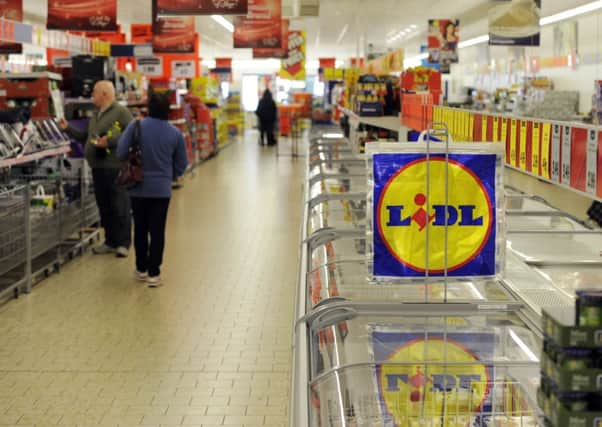Aldi and Lidl continue to beat big four


The German duo now command an 8.3 per cent share of the grocery sector and more than half of all British households visited at least one of the two cut-price chains over the festive period, latest research from Kantar Worldpanel showed.
CONNECT WITH THE SCOTSMAN
• Subscribe to our daily newsletter (requires registration) and get the latest news, sport and business headlines delivered to your inbox every morning
Advertisement
Hide AdAdvertisement
Hide AdAlthough the overall supermarket sector only managed to eke out growth of 0.6 per cent in the 12 weeks to 4 January, the firm said this increase marked the fastest rise in spending since August last year.
Fraser McKevitt, head of retail and consumer insights at Kantar, said: “Shoppers chose to buy a little more this Christmas compared with last year, a trend which has pushed sales growth up to 0.6 per cent. This is low in historical terms, but a rally for the supermarkets compared with recent months.”
Aldi was the clear winner over the festive season, with sales soaring by 22.6 per cent compared with a year earlier, and it now has a market share of 4.8 per cent – up from 4 per cent a year ago. Fellow discounter Lidl, which has 3.5 per cent of the market, enjoyed a rise in sales of 15.1 per cent.
Among the “Big Four” chains, Sainsbury’s put in the best performance but still saw its sales dip by 0.7 per cent year-on-year.
McKevitt said: “Sainsbury’s traditionally performs well at Christmas, and its seasonal boost this year means it is now Britain’s second-largest grocer for the first time since it lost the position in 2003.
“Given the seasonal nature of this share increase, there is a high likelihood that Asda will retake the number two slot later in the year.”
Asda, owned by US retailing giant Wal-Mart, suffered a 1.6 per cent decline in sales, as did Morrisons, which yesterday said it would be closing ten loss-making stores this year as it announced the departure of chief executive Dalton Philips.
Jasper Lawler, market analyst at CMC Markets UK, said: “Morrisons was late to the party with the introduction of its loyalty card, online shopping, as well as building convenience stores, but the price cuts introduced position it well to build these up substantially in 2015.”
Advertisement
Hide AdAdvertisement
Hide AdMarket leader Tesco – which last week cancelled plans to build eight new supermarkets in Scotland as it seeks to recover from an accounting scandal – suffered a 1.2 per cent fall in sales.
This was the chain’s best performance since March, but it continued to lose market share – down to 29.1 per cent, from 29.6 per cent a year ago.
As part of a radical restructuring, Tesco will close its headquarters in Cheshunt, Hertfordshire, as part of its aim to slash 30 per cent from the group’s overheads. The head office will move to the company’s other main administrative site, in Welwyn Garden City.
Intense competition in the sector, sparked by the growing popularity of Aldi and Lidl, continues to pile pressure on the major chains, but upmarket grocer Waitrose has maintaining its strong run, with sales growing by 6.6 per cent to take its market share to 5.1 per cent.
SUBSCRIBE TO THE SCOTSMAN’S BUSINESS BRIEFING